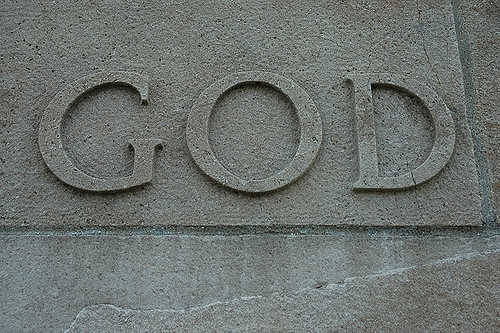Does anyone else get uncomfortable proclaiming things like “How Great is Our God” or “Our God is an Awesome God” or “Behold Your God” or even “Now Thank We All Our God”?
My problem is with the word “our.” What are we declaring when we modify the name “God” by adding that little word, or the word “my”? I think I know what is intended. It is probably meant to signify “God, as I understand God to be,” or “God, in whom I put my trust as my Creator, Redeemer, and Sustainer.”
Unfortunately, it’s not a good way of saying that. “Our” and “my” are possessive pronouns. We can try to stretch or bend or even tie them in knots, but they are still possessive pronouns.
Using a possessive pronoun in relation to God would be a more correct usage in conveying one of the following:
- “Our” distinguishes the deity we worship from the deities worshipped by others. The Psalms reflect a pervasive belief in multiple gods. They declare that YHWH, the deity with whom they have formed a covenant, is by far the greatest of the many divine beings and can do things the others cannot.
Christians today are not polytheistic. For us, “other gods” is now more reflective of priorities that take the place of God as the center of our lives, such as consumerism or pro football. Using “our”, however, continues to connote a polytheistic world view. It encourages non-Christians to view Christianity as primitive and superstitious.
- Ownership. As a possessive pronoun, “our” signifies ownership. While Christians do not presume to own God, the language, at the very least, promotes an arrogant view of relationship with God. Among other things, it leads to the Biblically-challenged belief that “I have found God,” and am therefore the agent of my own salvation.
- Manifest Destiny. The statement that God is “ours” as opposed to being “yours”, gives us the moral high ground. It leads to the passionate belief that “God is on our side” that has caused so much destruction in the world, rather than seeking be on God’s side.
I anticipate two counterarguments to my discomfort with “our God.”
- Christians don’t mean any of these three things when they say “our God.” Paul frequently said, “I give thanks to my God” and he didn’t mean any of those things. That may or may not be. The point is that language is important. Words are important. Why use language that points listeners in a direction we do not mean to take them?
- What about the Lord’s Prayer? Didn’t Jesus himself teach us to pray, “Our Father?” Our Father is different from Our God. It declares a parental relationship; it says that this one God of a universe in which there are no other legitimate gods, has declared this personal relationship with us, similar to the way in which parents relate to children, and has given us the right to claim this relationship. In other words, “Our Father,” does point the listener in the direction we mean to take them.
There are ways to convey faith, trust, and obedience to God without using any of the language of possession. In the Christian church, God’s majesty stands undisputed; there is nothing to be gained by problematic qualifiers.

